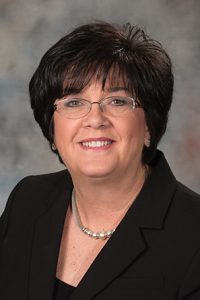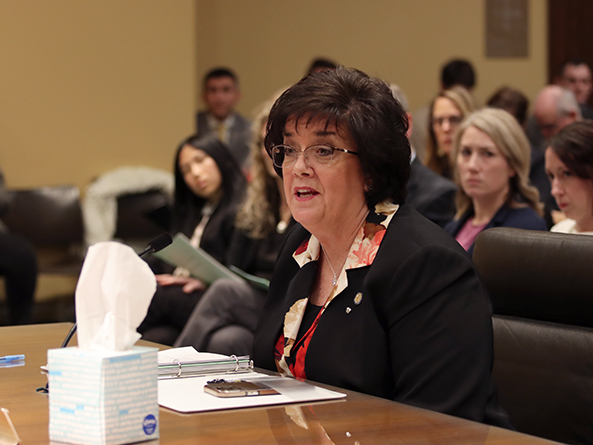Abortion restrictions proposed
Members of the Health and Human Services Committee heard six hours of testimony Feb. 1 on a bill that would prohibit abortions in all but the earliest weeks of pregnancy in most cases.

Current Nebraska law prohibits abortions at 20 weeks post fertilization.
LB626, introduced by Thurston Sen. Joni Albrecht, would create the Nebraska Heartbeat Act. Under the bill, physicians would be required to test for “steady and repetitive contractions” within the gestational sac that would be used to estimate gestational age before inducing an abortion. If such activity is detected, a physician would be prohibited from performing an abortion except in cases of sexual assault, incest or medical emergency.
A physician who knowingly violates the bill’s provisions would be subject to removal of their license to practice medicine. No one who undergoes an abortion would be considered to be in violation of LB626.
The following would be excluded from the definition of an abortion under the bill:
• removal of an ectopic pregnancy;
• removal of the remains of an unborn child who has already died;
• an act done with the intention of saving the life or preserving the health of the unborn child; and
• termination or loss of life to an unborn child who is not being carried inside an individual’s body during the practice of in vitro fertilization or other assisted reproductive technology.
Albrecht said protecting the “unborn” — the state’s most vulnerable citizens — is the single most important issue the Legislature will address. Every woman and every child deserves love, she said, and Nebraska will be at its best when every life counts.
“Let’s start here, in a place where we should all be able to agree,” Albrecht said. “Women deserve support and babies with beating hearts should be protected.”
Sandy Danek, executive director of Nebraska Right to Life, testified in support of LB626. Danek highlighted a recent study conducted on behalf of Susan B. Anthony Pro-Life America, which indicated that 58 percent of registered voters in Nebraska would support a bill protecting “preborn babies” after a heartbeat is detected.
“There’s a recurring theme within our state that people want preborn life to be protected,” she said. “Advancing policies like the Nebraska Heartbeat Act is consistent with Nebraska values.”
Nebraska Catholic Conference representative Marion Miner also testified in support of the bill. From the first moment of a child’s existence, they must be recognized as a human being, he said.
“Human beings have rights, not to be asserted over and against other human beings, but to be recognized equally before the law as persons deserving of love and protection,” Miner said.
Sherry Jones, testifying in favor of LB626, said the bill exhibits both common sense and compassion.
“A heartbeat is a universal sign of life, the most basic indicator of the existence of life,” she said.
Several physicians testified in support of LB626, stating that the bill would not interfere with their ability to provide emergency care to their patients and noting the long-term effects a woman may experience after having an abortion.
Robert Bonebrake, a board certified OBGYN and maternal fetal specialist, said physicians already care for patients with a wide range of pregnancy complications outlined in the bill. The paramount concern is the health and safety of the mother, he said, but there always should be care and consideration for the human dignity of babies, as well.
“LB626 lays out the clear standard for protecting a woman’s life and health,” Bonebrake said. “Any physician providing best medical practice is safe under this framework.”
Courtney Miller, a licensed psychologist with the Immaculate Heart of Mary Counseling Center, also supported the bill. Women can experience a multitude of physical, emotional and spiritual effects following an abortion, she said, including infertility, depression, substance abuse and subsequent childbearing complications.
“[LB626] recognizes the human nature of a beating heart and protects both baby and mother from the undeniable traumatic effects of an abortion,” Miller said.
Opponents of LB626 argued that many women do not find out they’re pregnant until they are past six weeks gestation, which is roughly when the bill’s provisions would apply, and outlined additional concerns.
Meghan Oakes, an infertility specialist, stated that women with irregular menstrual cycles do not always consider pregnancy as a possibility right away, a situation which could impact more than 37,000 women in Nebraska.
“All of these women will be slower to consider a pregnancy if their menstrual cycle is late — increasing the chance that termination is no longer an option,” Oakes said.
Reproductive endocrinology and infertility specialist Abigail Delaney also testified in opposition to the bill. She stressed the importance of keeping personal and religious beliefs out of medical practices.
“I do not need you to believe abortion is okay — what I need from you all is to allow me to be a doctor,” Delaney said. “I need you to get out of our exam room. I need you to allow me to shoulder the ethical burdens of the profession I chose.”
Testifying against the bill on behalf of the Nebraska chapter of the American College of Obstetricians and Gynecologists was Abigail Drucker. Recent data indicates that states with the most restrictive abortion laws have experienced increased rates of maternal and infant mortality when compared to states with less restrictive abortion access, she said.
“Women with chronic medical conditions, such as heart disease, kidney disease, blood clotting disorders or even cancer would be forced to remain pregnant while we, their physicians, watch and wait for them to get sicker or even die,” Drucker said.
Christon MacTaggart, executive director of the Nebraska Coalition to End Sexual and Domestic Violence, opposed the bill based on the unintended consequences it could have on survivors of sexual and domestic violence.
A 2020 Nebraska Statewide Intimate Partner and Sexual Violence Survey found that over 50 percent of women in Nebraska have experienced sexual assault in their life, she said, and nearly 50,000 experienced an unwanted pregnancy as a result.
“If a survivor of any form of domestic or sexual violence decided they cannot go through with a pregnancy resulting from this, they deserve access to care that is not conditioned on their willingness to share the traumatic details of their victimization,” MacTaggart said.
The committee took no immediate action on LB626.


